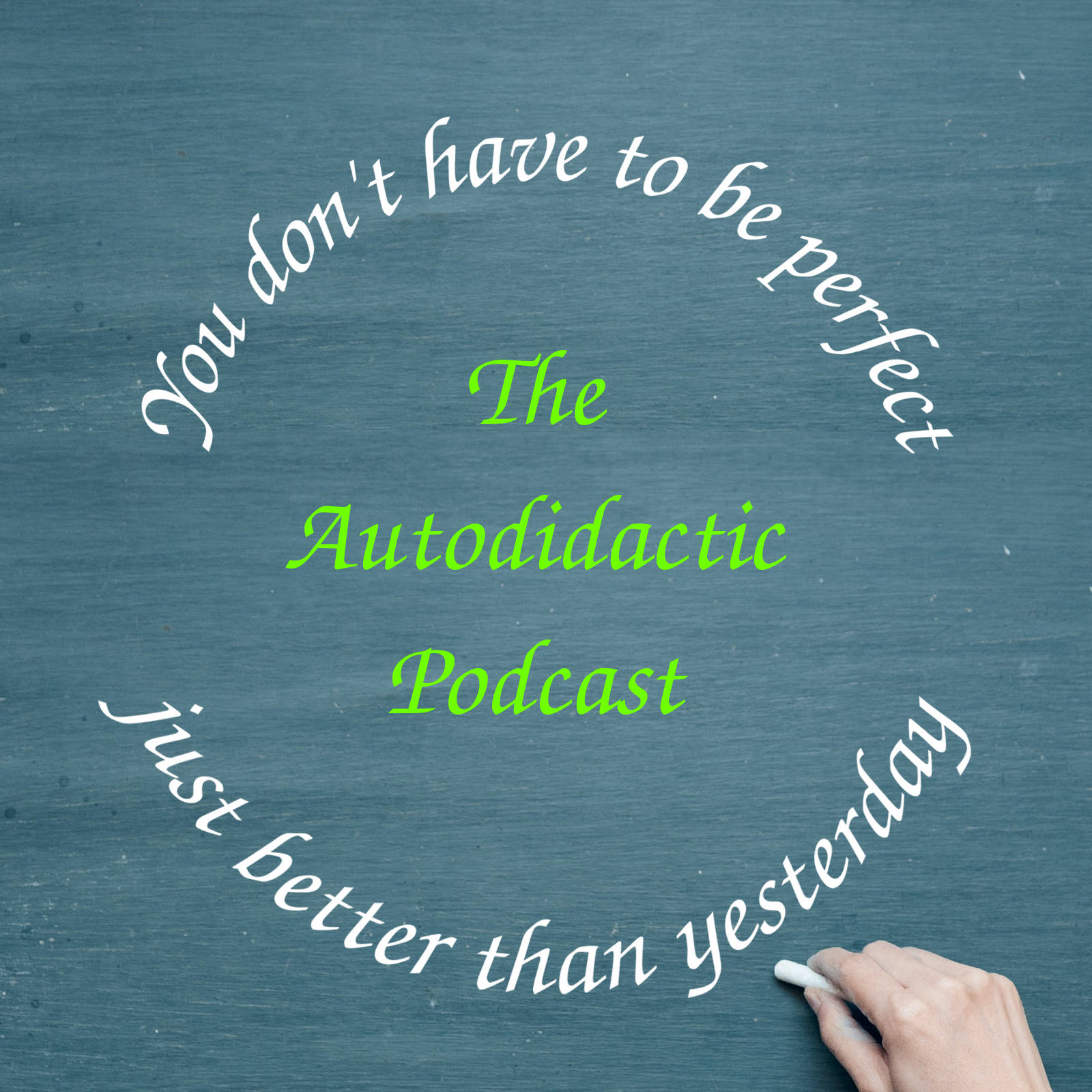
Subscribe to my Author Newsletter
Hello and welcome to the autodidactic podcast. This is season one, episode 13. If your a returning listener then welcome back! If you have just started to listen then welcome aboard.
We are at the end of season one. I had intended to do another show with answers to any questions I’ve received, but I think I can cover those at the end of today’s show. So unfortunately I’m going to end on unlucky number 13 for this Season.
I’m ending this season a bit early for a couple of reasons. The first reason is another Lockdown in the UK because of the Covid virus will mean I’ll not have the peace and quiet required to record a show, and because it is quickly approaching the holiday season. Therefore, I’m going to end Season One and return again next year for Season Two.
I haven’t yet made the show schedule for Season Two, so if you’re interested in hearing something in particular please email me at rick@autodidactic.info. If you’d like me to expand on anything we’ve already discussed in Season One I’m happy to do that as well.
Today I’m going to talk about getting qualifications or certifications for things that you’re self-studying. This is a difficult topic to cover in detail, since I don’t know what you may be studying. However, I’m going to give some examples of qualifications or certification testing which you can do in some topics which I’m familiar with and hopefully you’ll be able to apply what I’m saying to the area that you’re studying.
Professional qualifications are vocational training courses relating to a specific industry or career path. They are typically regulated and awarded by relevant professional bodies, and are designed to ensure that everyone employed in a particular job meets the minimum required standards of professional expertise.
The first example I’m going to give is related to Information Technology. Previously I had mentioned surveys indicated over 60% of all programmers were self-taught. Many Project managers, or other IT professionals are also self-taught and then take a relevant certification test in order to prove their knowledge to a standard. Some examples are Prince2 project management training, Togaf technical architect training, Microsoft Certified Engineers and many others.
For some jobs in the UK for example a professional qualification is required. For example, to work as a qualified solicitor you must take the Legal Practice Course (LPC), and to become a chartered accountant you’ll need to pass the relevant exams.
There is some form of professional qualification available in most industries. In the UK these include:
• Association of Chartered Certified Accountants (ACCA)
• BCS – The Chartered Institute for IT
• Chartered Institute of Personnel and Development (CIPD)
• Institution of Civil Engineers (ICE)
• Royal Institution of Chartered Surveyors (RICS).
These are just a small selection – there are many more.
• HR courses
• Management courses
• Marketing courses
• Sales training courses
• Social work courses
• Travel and tourism courses
The entry requirements for professional courses depend entirely on the qualification and what it leads to.
Many professional bodies offer different levels of vocational qualification, suitable for school leavers, graduates and experienced professionals. Typically, when you complete one exam, you become eligible to work towards another qualification at a higher level. Possessing some relevant work experience or having a demonstrable interest in the subject is often essential.
So how can you find out about some of these? Well in the UK you can contact the Federation of Awarding Bodies (FAB) – the trade association for professional awarding organisations offers a wealth of information and contacts. If you’re not in the UK search for trade organisations in the area that you’re studying and see who awards any qualifications or certifications.
Another area where you might want to gain qualifications is languages. For example the DELF, HSK, or other language proficiency examinations which will give you a standard level which you can then use as your official level in the language.
But outside of vocational training and languages what can you do to apply your self-study toward a degree program?
In the USA you can get some college credits using CLEP testing. CLEP stands for “College Level Examination Program.” It’s a set of tests developed and administered by the College Board.
So what exactly are the CLEP tests? They’re exams that test your knowledge of a variety of academic subjects. Many colleges and universities will give you credit towards a degree for each CLEP test you pass.
CLEP exams are much cheaper than a full college course. With the right CLEP tests and undergraduate program, you could get your degree in as little as a year. But you must find a University which accepts CLEP testing. There’s no point in taking CLEP tests if you can’t transfer your passing scores for credit.
Many countries will have similar systems for allowing you to bypass courses in favour of self-study.
Many MOOCs (Massive open online course) will allow credit if your signed up with the University.
It might be that you’ve decided you’re going to do a self-study course through a “mail-order” course, although nowadays they call it “distance learning”, which gives qualifications at the end. This is a good approach, and in the UK you can even get a degree completely through distance learning from the Open University.
So although it is difficult for me to give anything other than general guidelines, hopefully you can see that there are many different ways to have your self-learning and autodidactic work recognised by the rest of the world through some type of testing.
But remember that it isn’t always necessary to have a qualification to become a recognized expert. A simple example of this was my father, who although never had a single qualification as a car mechanic managed to have everyone we knew around to the house anytime there was a problem with their car. He loved working on cars and through self-learning had taught himself everything need to repair a car.
I’m sure you can think of someone who is a recognised subject matter expert without any formal qualifications.
Well that covers just about everything I can think of regarding getting qualifications as a self-learner. Lets move on to the questions I’ve had from listeners.
The main question I’ve been asked boils down to: “What have you taught yourself?”
I have taught myself quite a bit over the years by self learning. I’ve alluded to some of these in previous podcasts. I don’t want to “toot my own horn”, but since you’ve asked…
I have taught myself French and Italian to a good level over a number of years, and I’m currently toying with Mandarin Chinese. I also administer a language learners forum (links in the show notes) and so get a lot of advice and assistance there. If you want to learn another language then I highly suggest you take advantage of all the great advice and lists of resources available there. It is all free, no advertisements or anything so make use of that if you can.
I have taught myself a lot of programming languages over the years, so many in fact I’ve probably forgotten a few I did know. But these include Assembler, C, C++, Java, Javascript, Rust, Perl, Python, Tcl/tk, and a lot of database stuff, SQL, PLSQL, etc.
I taught myself Lean management, which used to be called the Toyota method. But having a need for this I read every book and resource I could find for over a year, averaging 5-10 books per week on the subject until I knew just about everything there was to know.
Another question I have gotten is related to this. “What are you studying right now?”
Right now I’m teaching myself basic electronics, ARM assembler programming, Flutter programming, and Mandarin Chinese. I also have an entire bookshelf of maths books ranging from basic maths to Calculus and Discrete Mathematics. I’m slowly making my way through these books a few minutes each day.
So you can see that I really do practice what I preach.
And the final question I want to cover is one that came in recently. Francois asked: “I have tried mnemonics but I still struggle to remember the stuff I’m reading. How can I improve my retention?”
There are a couple of things you can do, some of which I’ve covered before but just to emphasise they are:
• Take notes about what your are reading. Write them in the margins or in a notebooks
• Make up questions about what you are going to read and try to find the answers while you’re reading.
• Reading out loud frequently helps with retention. So if you can find somewhere you will not be disturbed and read out loud.
• Try reading at night. According to some studies retention is better if you read in the evening, and the reading is processed while you sleep.
• Where possible use physical books rather than ebooks. It seems readers forget more of what they read in an ebook.
• If you are going to use an ebook, try to get an ereader which will read to you. Some programs like Fbreader will read the text to you.
• Always skim before reading checking out the headings and making questions.
• Read in smaller chunks. Don’t read 10 chapters a day, read 10 pages and try to suck all the information you can from those few pages. Bite-sized is better.
• Try to summarise in your own words what you have just read. You can do this at the end of each page, just say it out loud.
• Always quiz yourself on what you have read.
So that is it for Season One!
I hope you enjoyed the show and the rest of the podcasts and I look forward to returning in the New Year. Meanwhile I hope you have a wonderful time of study and learning while we are apart. I really would like to gather listener feedback about the shows, and I’m interested in hearing what you’d like me to discuss in Season Two. So as always you can email me at rick@autodidactic.info or you can leave a comment on the website: https://autodidactic.info
See you next year.
